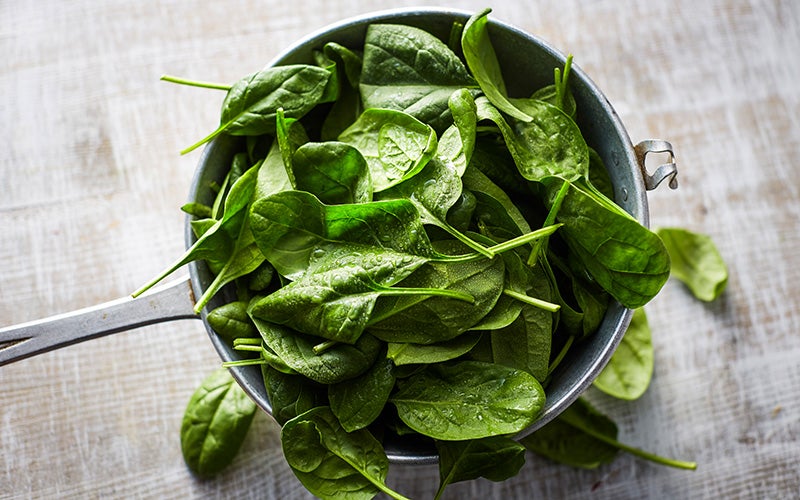5 Diet Mistakes You Need to Stop Making
 ©Westend61
©Westend61
Picture this: You’re doing everything right in your quest towards your feel-good body. You work out, you eat healthily, you get your daily steps in. Yet you’re not feeling that much better, and you’re really struggling to keep off the weight. What gives?
If this sounds like you, trust that you’re not alone. Forty-nine percent of U.S. adults try to lose weight each year, yet few people are actually able to meet their goals or even keep the weight off for good.
While there are a lot of complex factors that affect your weight, including genetics, environment, age and sex — most of which you can’t control — there is a common mistake that people make when trying to lose weight that makes things even harder.
No, it’s not a lack of willpower or “laziness,” despite what body shaming Instagram fit-fluencers might have you believe. It’s actually the opposite — resorting to extremes to lose weight faster. But while crash diets might provide immediate results, they can have serious side effects that affect you for years to come.
What is a crash diet, and why does it fail?
Crash diets essentially have people resort to extreme methods in order to lose a lot of weight quickly. People severely cut calories, skip meals, fast for days, and otherwise restrict their food intake, while going extra hard at the gym to burn as much fat as they can.
There are times when being “extreme” is okay. Extremely funny, extremely clever, or extremely happy, for example. But when you’re talking about weight loss, extreme is absolutely the wrong way to go. Resorting to crash diets or other extreme methods to lose weight can backfire in a serious way.
1. You might regain the weight you lost
Research shows that most people who lose weight end up gaining it back. This happens in part because your body has a survival mechanism for maintaining its weight. Sometimes this metabolism change is mild or temporary. But for people who lose a lot of weight in a short amount of time, research shows that it can affect metabolism for years. People then try dieting again to lose the weight, and then struggle to lose it or keep it off. This is called weight cycling or yo-yo dieting.
2. You may hurt your heart
As mentioned, weight cycling occurs when people are repeatedly gaining and then losing weight throughout their lives. This can often happen on crash diets, which can change metabolism. (As many as 55 percent of women and 35 percent of men have experienced weight cycling.) All that weight cycling affects more than just the number on the scale, though. Research shows that weight cycling is associated with a greater risk of poor cardiovascular health, including heart disease and high blood pressure, especially in women.
3. You’re not getting enough energy or nutrients
Nutrition is about more than just calorie counts. All foods contain a mix of vitamins, minerals, and macronutrients like carbs, protein, and fat. All of these aspects of food are important to keep your body functioning properly. If you severely restrict your diet, either by slashing calories or food groups, you run the risk of not giving your body enough energy or nutrients to function. This could lead to headaches, brain fog, vitamin deficiencies, and more.
4. You risk gallstones
Normally, your gallbladder stores bile, which is used to digest fats. But in people who have lost a lot of weight, the liver releases extra cholesterol into your bile. Losing weight quickly can also affect the gallbladders emptying ability. Both things increase the risk of gallstones. In fact, a small 2014 study found people on very-low calorie diets (500 calories per day) were three times more likely to need hospitalization for gallstones than people on low-calorie diets (1200-1500 calories per day). And if you’ve ever endured the pain of gallstones, you know they’re not something to be taken lightly.
5. You might injure yourself
If a crash diet plan also involves a punishing workout routine, you risk hurting yourself and losing any fitness gains—partly because you’re likely not getting enough calories and nutrients to fuel your fitness, and partly because you’re not resting enough, which can stress the body.
How to Meet Your Goals Without Crash Dieting
First of all, you should give major side-eye to any weight loss plan or “expert” who promises that you can achieve significant weight loss in a short period of time. Most health experts define sustainable weight loss as no more than one to two pounds per week. Promises of anything more likely come with a very restrictive string attached.
To help fuel your healthy weight loss efforts, be patient, and try the following strategies:
Related: Vinyasa yoga for recovery and mobility
Eat balanced, eat healthy
Keep your calorie deficit moderate, between 300-500 calories a day, and you can still see results. Don’t set any one food off-limits (unless you have a medical condition that requires it). And remember, healthy eating also includes the occasional treat! Enjoy the cookie when you want it, rather than denying yourself. One food or one day will not make or break your diet. And if you’re looking for a delicious, healthy snack option, try our Plant-Based Protein Squares.
Find the right workout balance
More isn’t always better. Especially when it comes to workouts: Listen to the signals your body’s trying to send. If you notice that you’re always exhausted and every workout’s just a bit harder than the last — and you’ve been going at the same intensity? Sure, a shaker of Recovery Aminos will get you part of the way back on your feet, but truly, your body needs a day to rest. Regularly. You want to keep up some active recovery? Go for it! Try some gentle yoga or a nature walk.
Related: 5 reasons why you should definitely go hiking
Look for new ways to measure your progress
Weighing yourself regularly and tracking calories are well and good. But if you’re so into numbers that you’re dreaming about calories and step counts, it’s time to set them aside for a while. Focus on how strong your body feels from the inside. On how far up the stairs you make it each day. Or any other thing you can think of. Make sure you remember to feel good about the work you’re putting into it.
Take a deep breath! Reaching the weight you’ve been hoping for, and keeping it there, takes time and patience. Don’t be too harsh on yourself along the way. And don’t lose sight of the fact that your health and well-being have to come before a number on the scale. It’s not a “mistake” to eat a piece of chocolate or to do three workouts a week instead of four. Put away your perfectionism and find a balance you can keep for good. That’s what will make your goals really stick.
More healthy eating tips from foodspring:
- Summer Meal Ideas to Stay Cool
- 14 Easy High-Protein Breakfast Ideas
- 12 foods for muscle building that you should always keep in your pantry
Sources for this article
We at foodspring use only high-quality sources, including peer-reviewed studies, to support the facts within our articles. Read our editorial policy to learn more about how we fact-check and keep our content accurate, reliable, and trustworthy.
- Kreitzman, S. N.; Coxon, A. Y.; Szaz, K. F. (1992): Glycogen storage: illusions of easy weight loss, excessive weight regain, and distortions in estimates of body composition, in: The American Journal of Clinical Nutrition, 56 (1).
- Cava, E.; Yeat, N. C.; Mittendorfer, B. (2017): Preserving Healthy Muscle during Weight Loss, in: Advances in Nutrition, 8 (3).
- Mackie, G. M.; Samocha-Bonet, D.; Tam, S. C. (2017): Does weight cycling promote obesity and metabolic risk factors?, in: Obesity Research & Clinical Practice, 11 (2).
- Dulloo, A. G.; Jacquet, J.; Montani, J-P.; Schutz, Y. (2015): How dieting makes the lean fatter: from a perspective of body composition autoregulation through adipostats and proteinstats awaiting discovery, in : Obesity Reviews, 16 (1).
- Dulloo, A. G.; Montani, J-P. (2015): Pathways from dieting to weight regain, to obesity and to the metabolic syndrome: an overview, in: Obesity Reviews, 16 (1).

































